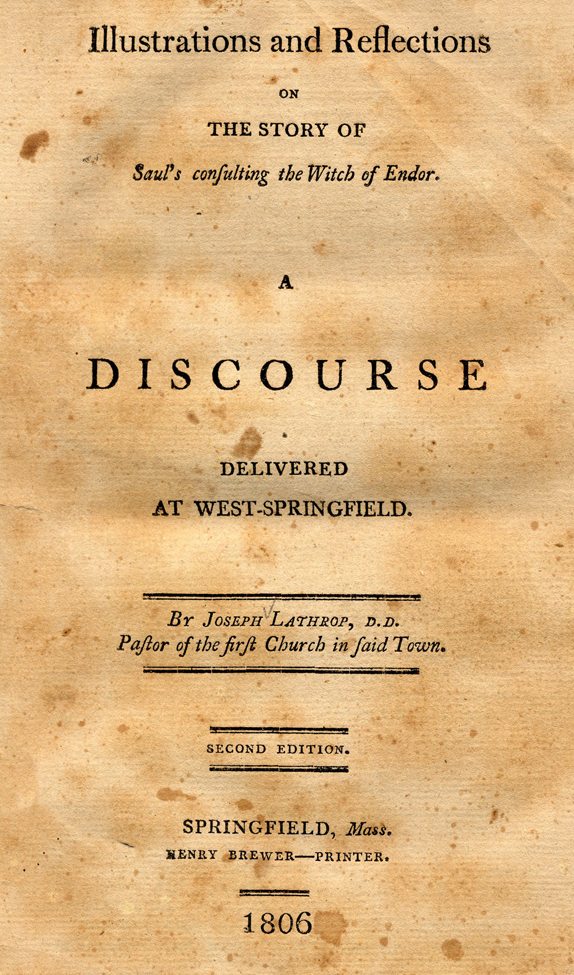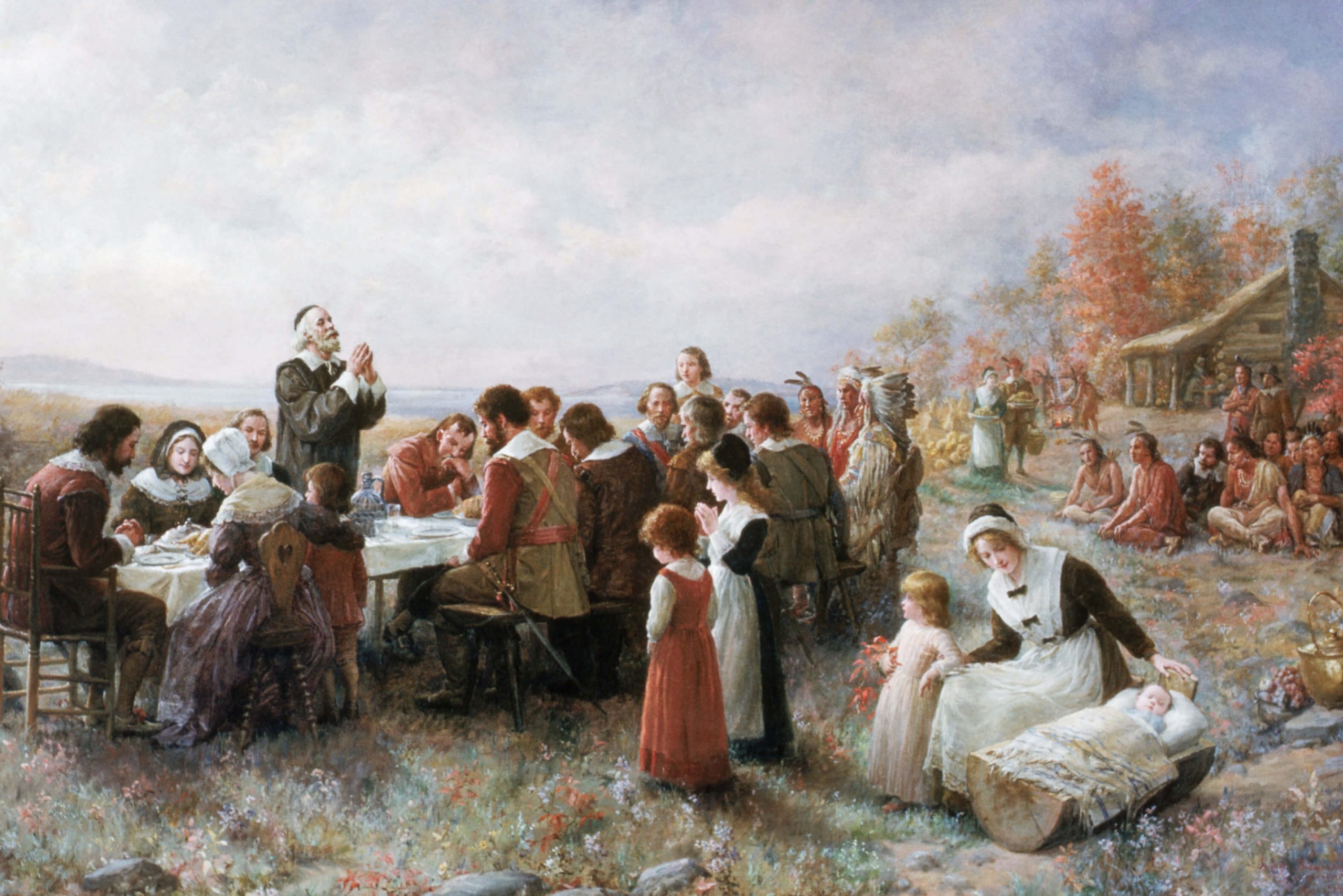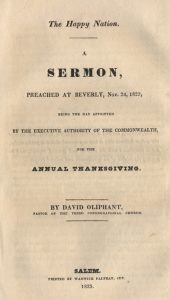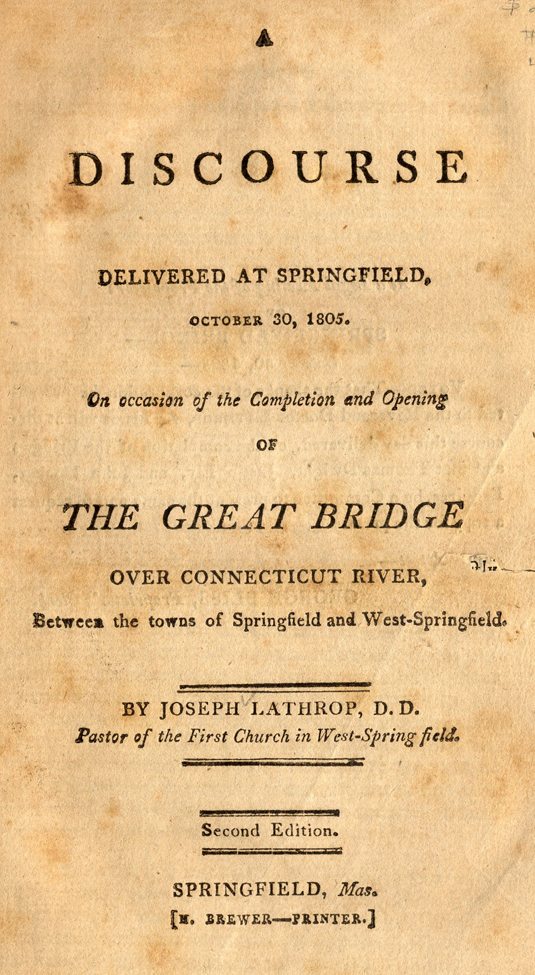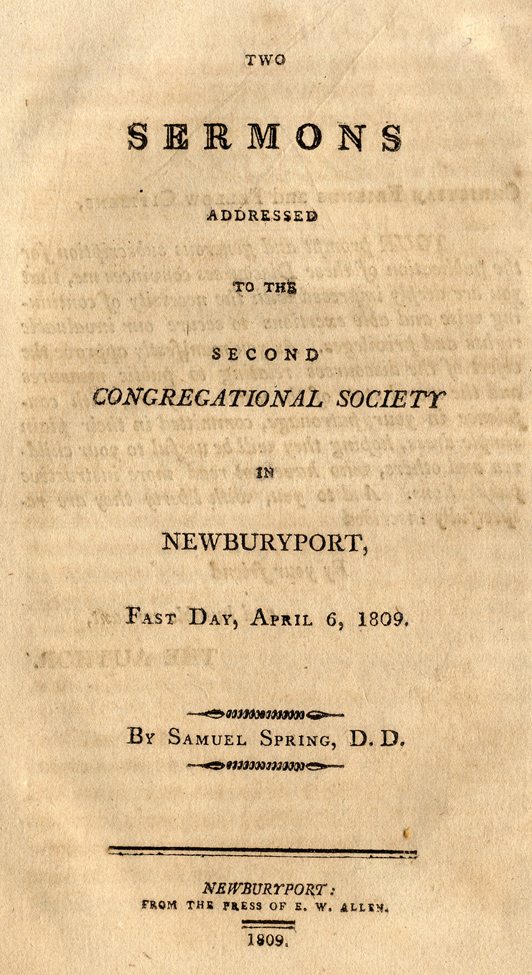Samuel Kendal preached this election sermon in Boston on May 30, 1804.
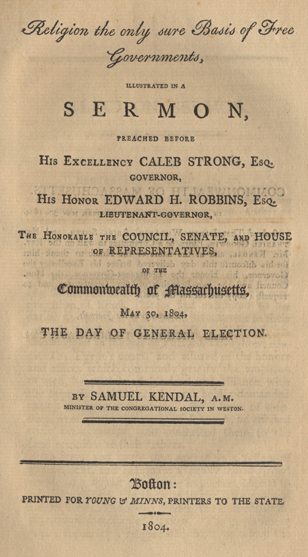
ILLUSTRATED IN A
SERMON,
PREACHED BEFORE
His Excellency CALEB STRONG, Esq.
GOVERNOR,
His Honor EDWARD H. ROBBINS, Esq.
LIEUTENANT-GOVERNOR,
The Honorable the COUNCIL, SENATE, AND HOUSE
Of REPRESENTATIVES,
OF THE
COMMONWEALTH OF MASSACHUSETTS,
May 30, 1804,
THE DAY OF GENERAL ELECTION.
By SAMUEL KENDAL, A. M.
MINISTER OF THE CONGREGATIONAL SOCIETY IN WESTON.
BOSTON:
PRINTED FOR YOUNG & MINNS, PRINTERS TO THE STATE
1804.
COMMONWEALTH OF MASSACHUSETTS.
Ordered, That Laban Wheaton, Abiel Smith, and Nathaniel Goodwin, Esqrs. Be a Committee to wait on the Rev. Mr. Kendal, and in the name of the House to thank him for his discourse this day delivered before his Excellency the Governor, his Honor the Lieutenant-Governor, the Hon. Council and the two Branches of the Legislature, and to request a copy thereof for the press.
Attest. NICHOLAS TILLINGHAST, Clerk.
ELECTION SERMON.
DEUTERONOMY, XXXII. 46, 47.
SET YOUR HEARTS UNTO ALL THE WORDS WHICH I TESTIFY AMONG YOU THIS DAY; WHICH YE SHALL COMMAND YOUR CHILDREN TO OBSERVE AND DO, ALL THE WORDS OF THIS LAW.
FOR IS NOT A VAIN THING FOR YOU; BECAUSE IT IS YOUR LIFE; AND THROUGH THIS THING YE SHALL PROLONG YOUR DAYS IN THE LAND WHITHER YE GO OVER JORDAN TO POSSESS IT.
This important advice was given by the Jewish Legislator, just before his death, to the whole congregation of Israel. Moses had exhibited to his nation unequivocal proof of his attachment to their interest, freedom and happiness. Although acknowledged as the son of Pharaoh’s daughter, educated at Egypt’s court, and assured of the honors and offices which commonly gratify the ambition of men, he disclaimed kindred and alliance with the oppressors of his people, and boldly demanded their release from servitude. By a series of wonders, wrought in the name of Jehovah, he effected their emancipation, and conducted them to the land promised to their fathers.
To form and carry into operation a system of government, and habituate a newly emancipated people to rule and order were important objects to be accomplished. In these, as in the deliverance of the Hebrews, Moses was under the immediate supernatural direction of Heaven. The government was a theocracy; religion the basis on which the whole structure rested. Their institutions, civil and religious, happily combined to improve the nation, and to guard it against being corrupted by admitting strangers to an equal participation of all its privileges. In its advancement from bondage to an independent rank among the nations of the earth, the people were led by the hand of Moses and Aaron; by the civil magistrate and the minister of religion. Each was a chosen instrument to carry on the merciful designs of Providence in respect to ancient Israel; and each the world hath ever found necessary to promote the peace, order and improvement of society.
Arrived at the borders of the promised land, and apprized that he should not be permitted to pass Jordan, Moses gave the people a new edition of the law in the book before us; and, to aid their memory, rehearsed the mercies and judgments of God, and the duties and dangers of Israel, in a divine song; in which, with an eloquence worthy of his subject, he celebrated the praises of Jehovah, and warned the nation against departing from the statutes he had appointed unto them.
Having concluded his song, the prophet said to the congregation, assembled to hear his last instruction, “Set your hearts unto all the words which I testify among you this day; which ye shall command your children to observe and do, all the words of this law.”
The two great commandments in this law, on which all the rest depend, according to our Savior, are to love the Lord our God with all the heart, and our neighbor as ourselves. It therefore related to religious, moral and social duty. In this view of it the people were directed by their great deliverer, whose character and achievements, situation and prospects, gave weight to his counsel, sincerely to regard its rules and precepts, and to teach and command their children to observe them. The reason assigned for the injunction we have in these words: “For it is not a vain thing for you; because it is your life; and through this thing ye shall prolong your days in the land whither ye go over Jordan to possess it.”
By the life of a community we understand its political existence, independence, freedom and happiness. In the preservation, or loss, of these, whatever may be ascribed to natural causes, we often observe the powerful effect of moral causes. To show the influence of these upon national freedom and prosperity is more particularly the duty of the ministers of religion. To this the subject directs our attention. The importance of the injunction in the text will appear from the truth and weight of the reason by which it is enforced. Our main object, therefore, will be to illustrate this general truth, viz.
That religion, and the moral and social virtues, of which that is the great spring, are, under God, the life and security of a free people.
In attempting this, the speaker must rely on the candor of our civil fathers, and of this numerous and respectable assembly. What he proposes is, briefly to hint at the necessity and end of civil government; then show that religion is the only sure basis of good government; that its influence upon communities is salutary; that it is the only rational ground of mutual confidence; and that the Christian system is most favorable to liberty and social order.
The necessity, or at least the expediency, of civil government might be inferred from the universal adoption of it among all nations whose history is known. But we perceive for ourselves that it is impossible for society to exist without it; and conclude, as man is a social being, the Creator designed he should be a subject of law and government.
The end of government is the protection, improvement and happiness of the community. To accomplish this end, as in the natural, so in the political body, there must be a head, or governing power, which shall direct the operations of the members, combine their strength for the common defence, and unite their exertions for the public good.
That is the best government which most effectually restrains the dissocial passions, prevents crimes, and, with the least restriction of natural liberty, preserves order, dispenses justice, and procures to the whole the greatest happiness. To these ends the fundamental principles of every government, and all the laws of the state, should be adapted. The government, whose object or tendency is any other than the public good, or whose administration is guided by other motives than the general interest, neither comports with the design of Heaven, nor merits the esteem and confidence of men.
But such is the imperfection of man, that nothing depending on human authority only is adequate to the proposed end of civil government. The language of experience is, that to control the passions, and habituate men to the love of order, and to act for the public good, some higher authority than that which is merely human must influence their minds. Their views are often too limited to comprehend the reasonableness of yielding private interest and inclination to public utility, or the connexion between surrendering a portion of their natural liberty, and enjoying civil liberty, under the protection of law. The institution of government many seem to imagine designed, not for their own, but the benefit of a chosen few; and though they may dread the sanctions of the law, and the power of the magistrate; yet, feeling no moral obligation to obey, and hoping to evade legal justice, they have but slender motives to obedience while unrestrained passion, or personal interest, impels them to counteract the established system of rule and order; or, if they have correct notions of the general design and tendency of good government, yet viewing it merely as an ordinance of man, and reflecting on the imperfection of legislators, they have but a feeble sense of obligation to observe laws, which oppose their immediate advantage. Fond of self government, they reluctantly delegate the necessary power to others; and when they have consented to it, a jealousy of their rulers often renders them hostile to their administration. Some higher and better established principle of action, than a view to public interest and convenience, must operate on the minds of most men, to render them good members of a civil community.
But what must this higher principle be? The ideas of some seem to have been that there must be a system of political morality established, whose object shall be to fix certain rules of social duty, to the observance of which all shall be obliged by the authority of the state. But if such system is to rest solely on the authority of human laws, and to be the result of human wisdom only, its fitness will be always liable to doubts, and a violation of its principles and rules thought no great crime. It being, as I think it must be, conceded that morality is essential to the support and due administration of government, let it be considered whether the laws of morality must not have some higher origin than the consent of political bodies, and be enforced by other authority than that to whose aid they are deemed necessary. Nothing is gained if they are not supposed to proceed from some superior power, to which human beings are amenable. This can be no other than God. Religious faith, or sentiment, must then be called in to the support of that morality, which is essential to the order and well-being of society; and is, therefore, the basis on which good government ultimately rests.
Belief in the being and providence of God, and that he hath given to men a perfect law, the transgression of which is an offence against him, will furnish motives to virtue suggested by no other consideration. Exclude the thought of a God, of a providence, and of future retribution, and we sap the foundation of morality and social order, and brutalize the human character.
All nations, however ignorant of the true God, and of the worship most acceptable to him, have practically acknowledged the importance of religious sentiment. Sensible that it was the support of virtue, the sages of antiquity inculcated reverence for the imaginary deities of their country; and deemed it hazardous to we4aken the influence of religious opinions; though many could not but perceive that the objects of adoration were really no gods.
As everything in the natural world evinces the existence of a supreme intelligent Agent, so every faculty of the human soul indicates that man was formed for the exercises of religion. If not sufficiently enlightened for that which is pure and rational, he adopts that which is wild and extravagant. Perceiving this universal propensity to some religion, and despairing, probably, of leading the world, by the bare light of philosophy, to a discovery of the divine perfections, the wisest and best men were careful to improve the general sentiment as a motive to every moral and social virtue. Among the Romans, before they had learned to contemn the gods, an oath was a greater security for the faithful performance of a trust, than any bond that could be entered into by the more corrupted and atheistic Greeks. Their idea was, that men will not be induced to perform the duties which result from their social relations, unless they suppose themselves under the inspection of some invisible powerful agent, to whom they are responsible.
Absurd opinions in religion, it is true, were embraced, and gods of different characters adored; and each walked in the name of his god; but in all nations some things have been deemed virtuous, and others vicious; and their religion had a tendency to encourage the one, and to repress the other. Their morals received support, and their government aid, when they were most free, from their religious opinions; and it is more than probable that, notwithstanding all their darkness and pagan superstition, tradition had scattered some rays of the true light, which were the principal cause of their brightest virtues.
Some moderns, contrary to the sentiments of the best men in all ages, have impiously asserted, that the idea of a God is subversive of free governments, and tends to support tyrannic rule; and more than intimated that it hath degraded human beings, kept most nations enslaved, and concealed from them the true liberty, dignity and perfectability of man. But judging from the visible disastrous effects of these principles, the conclusion is, that so far as their advocates, according to their ideas, have disencumbered the public mind of religious sentiments, and freed the passions from their restraining influence, they have prepared the way for cruelty and crimes of every description. The experiment has been made in Europe. Heaven forbid that it should be repeated in America!
As the body politic, like the natural body, consists of many members, it is certain all cannot hold the same place, and perform the same functions; but will have parts assigned according to their relative situations and connexion with the body; and the grand desideratum is, to infuse into the whole some general principle of action, which, preserving the unity of the body, shall induce each to perform the duties of his station. What beside religious sentiment will uniformly have this effect? Will a principle of honor, or regard to public opinion, supposing it to be enlightened and correct? However these might prevail with a few of a refined taste, enlarged understanding, and superior education, early habituated to respect the precepts of virtue, they have been always found insufficient to regulate the generality of mankind. The idea of a God, and the hopes and fears connected with it, are indispensably necessary to secure the practice of that virtue, which is requisite to the preservation, order and happiness of society. Impress on the public mind a full belief in an all-seeing God, whose law and government are perfect, whose honor is concerned in the obedience of his creatures, and who will render a just recompense to all; and it will be a steady motive to those virtues which are the ornament and life of society, and the glory of man. Add to this general sentiment a persuasion that we have a clear expression of the divine will in the sacred Scriptures, and it must have a happy influence upon public manners, and be a source of individual consolation and hope. The great, rich and honorable, it will teach moderation, humility and condescension; the poor and lowly, it will elevate to dignity of thought, design and action; and present to each a prospect of that state of equality in which they shall appear before their righteous Judge.
In the present world there is neither a real nor apparent equality in the conditions of men. Different abilities, success, power, station and influence, are visible in every community. This arrangement is not an human invention; it is the work of Providence; and an attempt to change the present order of things and reduce all to perfect equality, would be to wage war with Heaven, and exalt the wisdom of man above that of the Creator. The natural rights of men are equal; but their actual advantages and improvement are unequal, and lead to different stations; in which religion teaches them to be content, and faithfully perform their part, as members of the same body, having like care one for another.
Rulers are the constituted head. Their elevation is honorable, their office important, and their characters dignified with the title of gods, and ministers of God. But being men of like passions with other men, in proportion to the importance of their trust, and to their burdens and temptations, they need the influence, support and direction of religious principle. This is equally necessary to secure their fidelity, and to enable them to bear the trials incident to their stations. Realizing that they are subjects of the divine government, elevated to rule over their brethren, as God’s vicegerents, and entrusted with authority, for the exercise of which they are responsible to that Being, who “standeth in the congregation of the mighty, and judgeth among the gods,” they will make the divine character, law and government, as far as possible, the model of their own. The same principle that induces the ruler to be faithful will incline the people to honor and obey him, as one who exercises “the powers that are ordained of God,” and under his wise administration to “lead quiet and peaceable lives in all godliness and honesty.”
Let it be added; religion is the only rational ground of mutual confidence. Every person has some governing principle of action; either a supreme regard to the Deity, or to himself. If the former, as God is immutable and his law perfect, he will be just whose conduct is regulated by such a standard. His sense of accountability at a tribunal where no artifice can disguise the truth, no subtilty evade a righteous decision, preserves his integrity. But, destitute of this, the predominant passion, or private interest, will determine the conduct of a man; and as it is impossible to foresee what these will be at a given period, because liable to vary with situations and circumstances, there can be no reasonable confidence that he will observe any fixed rule of duty. Public opinion may have considerable influence upon him; and were this never affected by the same passions and prejudices, or by the same want of information, that occasion the errors of individuals, it would merit all the respect it ever received. But it is variable; and sometimes takes its complexion from designing men, who allege its authority in support of measures justifiable on no other ground. It cannot, then, be a fixed standard of right conduct in all cases; because, according to its own concession, it is sometimes misguided; in which case, he who is governed by it may act in opposition to what he perceives the laws of justice and the public good require. But a religious or moral principle leads to the discharge of duty, without considering how the performance of it may affect a man’s popularity; and is the only security that men will, at all times, be faithful in their stations.
The dependence of government upon religious sentiment is recognized in the legal administration of an oath, the solemnity and obligation of which will be diminished as the influence of that sentiment shall be destroyed. Impress it more deeply, and its effect will be more evident and salutary. If the great principles of religion were to actuate the whole political body, we should soon see society advancing to its highest perfection.
Christianity is designed to give these principles their full effect. It presents a clear view of the divine character, and of the duty and destiny of man; and furnishes the strongest motives to virtue by inspiring new and more sublime hopes than the light of nature ever imparted. Not in the least diminishing the grandeur of the thought which surrounding phenomena suggest of a God, it introduces to the mind the idea of goodness, or grace, as the connecting link between men and their Creator; by which they may rise to a resemblance of the great standard of moral excellence; to the dignity and privileges of sons of God. It represents our liberty and happiness to be objects of the divine care, exhibits astonishing examples of benevolence, and requires in us the same heavenly temper. It offers a remedy for our moral disorders, and support under natural evils. It enforces every precept of virtue by the consideration that present behavior will affect our future condition; that God is the witness, and will be the judge of our conduct; that no distinctions, however honorable here, will avail us in the day of final audit; that truth and faithfulness lead to glory, vice and folly to shame and confusion. It forbids the indulgence of the selfish passions, and encourages a generous philanthropy. In its great Founder we behold a perfect pattern of all righteousness; its doctrines enlighten the mind and improve the heart; and its whole spirit is that of harmony and love, which has a benign aspect upon the state of civil society.
It is objected that Christianity hath been the occasion of cruel wars and bloodshed. But until it can be shown that these are the natural effects of Christian principles, or agreeable to the spirit and precepts of the gospel, the objection proves no more than that the best gift of Heaven is capable of being perverted by ignorant or designing men. With equal truth and justice might it be affirmed that patriotism is not a virtue, because under its name scenes of disorder have been introduced, and states enslaved; or that liberty has nothing in it lovely, because the excess of it leads to anarchy and despotism, as that Christianity is unfriendly to the peace and improvement of society, because some have assumed it as a mask for their enormities. The most ingenuous among its enemies have conceded that such objections cannot be fairly urged against the system.
The maxims, as well as the general spirit of this religion, are equally favorable to rational liberty, and to good government. Christianity, indeed, authorizes no particular form of civil government in preference to another; but it speaks of government in general as an ordinance of God, points out its design, and enjoins submission to it, “not only for wrath, but also for conscience’ sake.” It teaches us to consider rulers as the “ministers of God, sent for the punishment of evil doers, and for the praise of them that do well.” It forbids us, though “free, to use our liberty for a cloak of maliciousness;” and commands us to “render to Caesar the things which are Caesar’s, and to God the things that are God’s;” and not, like the Pharisees, under pretence of religion, to stir up sedition, or, like the Herodians, make a compliment of our religion to Caesar, that we may be in favor with him. By placing all the moral and social virtues on their proper basis, urging them by the highest motives, and introducing charity as the great bond of perfectness, it provides against the evils which result from defect in all human institutions. Under its governing influence, the magistrate will ever keep in view the design of his appointment; the people, the reasons for their submission; and both a nobler motive to their respective duties than ever actuated an unbeliever.
True piety and pure morals, it is maintained by many, would preserve the freedom and happiness of a nation to the latest period of time. Not to say anything of the divine promises, facts seem to justify the supposition. Corruption of morals and manners has always preceded the fall of states, kingdoms and empires; and with its usual attendants, lust of power, party spirit, intrigue and faction, sanctified by the specious name of patriotism, or disguised under the flattering pretence of liberty, has been the visible cause of their loss of freedom and independence, or of their entire ruin. But should it be admitted that the political body, like the natural, has its f=infancy, youth and manhood, and must at length sink under the inevitable infirmities of age; that like all earthly things it is subject to decay; still it may be true that religion and virtue, as a suitable regimen and sober habits preserve natural life, will prolong the term of its health, prosperity and glory. But, as certain vices destroy the human constitution, and bring men to an early grave; so impiety and general corruption of manners hurry on the decline of political bodies, especially of free republics, or, by inducing some violent disorder, cut them off in the meridian of their splendor.
These truths admitted, the following inferences will be natural.
The first is, that genuine patriotism, as well as personal considerations of infinite moment, requires a strict adherence to the advice given to Israel. Indifference to religion, or to the means of extending and perpetuating the knowledge and influence of its principles and duties, is totally incompatible with enlightened zeal for the freedom and best interest of our country. General information, reverence for the worship of God, and its necessary institutions, and virtuous habits, in a political view, are of the highest importance. Without these it will be impossible long to maintain our free constitutions. Ignorance, or corruption of morals, will have an immediate effect upon the government whose powers emanate from the people, and whose administration is guided by the public will. Through want of information a virtuous people may be induced, under the idea of amendments, to co-operate in schemes subversive of the principles of their government; but when freed from the salutary restraints of religion and virtue, they are in danger of being hurried through the turbid sea of licentious liberty to the rugged and inhospitable shores of despotism. Deceived and demoralized, they will be prepared to second the views of ambition, and to aid any aspiring genius that may grasp at unlimited power. To remain free, a people must be enlightened and virtuous; and in order to this, they must cherish institutions calculated to promote knowledge and virtue. These, in free states, are the sources of political life, and claim our high consideration and respect.
It is worthy of observation, that one part of the law to which our text refers was designed to secure the nation from the corrupting influence of “aliens from the commonwealth of Israel,” who, though permitted to enjoy certain privileges, were not allowed to exercise all the rights of citizens; and that Israel seldom failed to suffer by departing from the law in this respect. This provision the wisdom of God ordained for the safety of his chosen people; and it merits consideration in every age and nation.
Natural as well as moral causes operate the destruction of republics. The Roman commonwealth, fallen indeed from her republican virtues, was at length crushed by her own weight. Extending her territorial possessions, she lost her freedom. This might have been expected; for the central force in all cases must be proportionate to the extent of its intended operation, and to the repelling power to be overcome. In free republics it is limited, that liberty may be more secure; but extending the space over which it must operate induces the necessity of increasing the momentum; which may effect a radical change in the government, more or less injurious to liberty, introduce monarchy, a more to be dreaded aristocracy, or, which is commonly a disastrous event, lead to the division of a large into a number of small rival states.
But it belongs rather to the politician than to the minister of religion to contemplate and guard against such dangers. They are increased by neglect to improve the public mind in knowledge, virtue and religion, and to strengthen the general attachment to the principles of the government, and aversion to frequent innovations. As ours is a vastly extended republic, composed in some measure of jarring materials, of the bond and of the free, the feelings of every true patriot and friend of republican government, must be deeply interested in preserving pure the sources and vehicles of information, and in extending, among the bond as well as the free, the means of religious and moral instruction.
The example of our venerable ancestors is recommended by the success of their exertions. In their view everything possible was to be attempted to disseminate knowledge, and fix in the public mind the principles of religion and virtue. As soon as the desert became so far a fruitful field, as to afford sustenance to a few families, they formed into little societies, whose most prominent feature was reverence for the institutions of religion, and care of the education of the youth. Heaven smiled upon their laudable efforts; and we feel an honest pride in paying a tribute of respect to their memory, and in acknowledging the advantages we have derived from their attention to these things; the effect of which upon the present state of society in New-England, compared with what it is in those sections of our country where the same views did not actuate the first settlers, is as happy as it is visible. Our fathers have transmitted to us a fair inheritance; and through the efficacy of the same means, if as generally adopted, we may hope to hand it down to posterity.
We next infer, secondly, that lessening the influence of religious sentiment, to which neglect, or contempt of sacred institutions tends, is extremely hazardous to the public weal. Persuade men that they are under no law to God, that his existence and providence are doubtful, their accountability and a future state uncertain, and they will be prepared, if passion or interest urge, to trample on the authority of all law and government. To secure order and justice, the arm of the magistrate must be strengthened, and liberty abridged, in proportion as the influence of religion is diminished.
To effect designs, the execution of which required the unrestrained indulgence of the worst passions of the heart, their authors have used means to pervert or destroy this influence. If atheism do not best comport with their purpose, they will, if possible, pervert the sentiment, and make religion consist, not in rational piety and humble obedience, but in passion and blind devotion; and render it subservient to their views by infusing into the mind the unhallowed fire of enthusiasm, or the gloomy severity of bigoted superstition; either of which detracts from the credit of religion in general; through less disastrous in its effects than the total annihilation of religious principle.
To prevent a return of the revolted tribes to the house of Judah, Jeroboam “set up golden calves, and made priests of the lowest of the people;” thus corrupting religion to secure his reign over Israel; the melancholy consequences of which are seen in almost every page of their history. For a purpose not very dissimilar, in later times, a still bolder step hath been taken, and an attempt made to establish absolute atheism; the success of which, though partial, hath blackened the character and multiplied the miseries of man.
Eradicate all sense of accountability to the moral Governor of the world, and what security could there be that iniquity will not be framed and established by law? Oaths of office, or of evidence, will not bind men to be faithful, or true. The streams of justice will be polluted, or turned from their course, and passion, interest, or prejudice, decide the fate of innocence. The judge, it is true, who neither fears God, nor regards man, who has no sense of religious or moral obligation, to avoid the inconvenience of importunity, may avenge a poor widow; but will never do justice from a higher motive. As it may best accord with his convenience, he will neglect the oppressed, or aid the oppressor. There is nothing in his conscience to ensure the faithful administration of justice. Life, everything dear in life, or valuable in society, depending on him, is at hazard. Place in the several departments like characters, and what confidence can there be in government? Would not civil commotions and scenes of violence soon commence, and continue till someone, more artful, ambitious and successful than the rest, elevate himself upon the ruins of liberty and republican virtue?
Convinced of the salutary influence of Christianity upon the state of civil society, and of its tendency to preserve a free government, suspicion justly attaches to the political principles and views of its avowed enemies and revilers. Enlightened friends of the people, and of equal laws, can never wish to bring into discredit and contempt, the benign religion of the gospel. By doing this among a people educated in the belief of it, they destroy the influence of religious sentiment in general; because the mind has been in the habit of associating the doctrines of revelation with the first principles of religion, and of supposing the existence and providence of God no more certain than the divine mission and authority of Jesus Christ. Though some are able to distinguish between natural and revealed religion, and, rejecting the latter, profess to embrace the former; yet it will be found, with many at least, that speculative deism and practical atheism are nearly allied. The prevalence of either will excite concern in the virtuous patriot, not for the ark of God only; but for the honor, freedom and safety of his country. Under this impression, the injunction of the Jewish lawgiver will command his attention, religion and its institutions his reverence and support, as the best means of improving society, giving stability to a free government, and permanency to every social enjoyment.
Religion and virtue, we infer, thirdly, will be a prominent feature in the character of wise and good rulers. These are important qualifications for their stations. To concede the general utility of such a principle of action, and yet suppose it unnecessary that rulers should be under its influence, is too great an inconsistency to be seriously maintained. The piety and virtue requisite for the preservation of the body politic ought to be visible in the head. If this be sick, the whole heart will be faint. Void of religious principle, or sense of moral obligation, can we believe that civil rulers will be the ministers of God for good? May we not rather apprehend that they will be an encouragement to evil doers, and a terror to these who do well? But a steady eye to a presiding Deity, with humble reliance on the wisdom of his providence, will direct, animate and support them in all the duties of their office, make them faithful, and render them superior to the trials that may await them.
Moses provided able men, such as feared God, men of truth, hating covetousness, to be rulers of thousands, of hundreds, of fifties, and of tens; a clear indication that in every department men should be placed, who will act in the fear of God. Destitute of this, their influence and example will tend to subvert the foundations of social order, to weaken the springs of political life, and to corrupt the whole system.
But must our civil rulers be Christians? It certainly cannot be less important to the general interest that they should be, than that other members of the community should be under the influence of this religion; and the constitution of this commonwealth requires of them, previous to their entering on the duties of their office, a declaration of their belief in the Christian religion, and full persuasion of its truth. As that does not contemplate evasion, an unbeliever, whatever he might be tempted to affirm, would not possess the qualification which the constitution makes requisite. As an expression of the public sentiment this provision has merit; but religious tests are feeble barriers against unprincipled men. They take no hold on the conscience of one who mentally consigns himself to an everlasting sleep, and never acts with reference to a judgment to come. It ought, however, to be presumed, unless there should be decisive proof to the contrary, that no man will ever hazard his reputation for veracity, and the confidence of his fellow-men, so much, as to make the declaration in opposition to his inward conviction, and common profession. We may feel assured, at least, that he would not, after such a declaration, place himself in the ranks of the avowed enemies of Christianity. Should this happen, what ground of confidence would be left? The speaker feels almost constrained to apologize for a suggestion so dishonorable to human nature. A possible case only is supposed. Should it ever exist, no apology would be due.
If Christianity tend to enrich the heart with every amiable and beneficial virtue, and highly to improve the present condition of man, it is of vast importance that rulers should feel its influence, and reflect the light of it on every beholder.
We infer, fourthly, that wise and good rulers will guard and promote the interests of religion and literature. One is the parent, the other the handmaid of virtue. To extend the knowledge and influence of those truths, on the observance of which the freedom and happiness of the state depend, merits and will command their attention. Like Moses, they will endeavor to make the people know the statutes of God, and his law. Tending to the public good, this is one end of their appointment. They will regard the immutable laws of justice in the structure of all the laws of the State, which must result from the divine law, applied to the circumstances of the people. When made, the wise and virtuous ruler, by a punctual observance of them, will add to their dignity and authority in the view of the community.
To prevent is more noble than to punish crimes. The means, therefore, to improve the understanding, mend the heart, restrain the dissocial passions, and call into exercise the benevolent affections, will receive countenance and support from the faithful ruler. On the side of religion and virtue he will give the whole weight of his example and influence. As these have a powerful effect in forming the public sentiment and manners, he will respect the law of God, honor the Savior, reverence the institutions of religion, encourage attendance upon them, and discountenance every practice that would defeat their design.
The opinion of some, that government ought to take no notice of religion, that it is the exclusive concern of the Deity to preserve the worship of himself in the world, and that it would be presumption in legislators to enact any laws relating to it, is not correct, nor consistent with the practice under the freest governments. Improper it would be, and what it is to be hoped we shall never see in our country, to enact “laws to dictate what articles of faith men shall believe, what mode of worship they shall adopt, or to raise and establish one mode of worship, or denomination of Christians above, or in preference to another.” In these respects let the mind be perfectly free, and all denominations equally under the protection and countenance of the law. But the support of institutions calculated to promote religious knowledge in general, give efficacy to the precepts of the gospel, instill the principles of morality, and improve the social affections, may be a proper subject of legislation. Blasphemy is punished by law, not because God is unable to vindicate the honor of his name; but because it is a crime which weakens the bands of society by lessening the solemnity and obligation of an oath; and legal aid may be given to religious institutions which strengthen those bands of society by extending the knowledge and influence of the sentiments, which gie to an oath its whole force upon the conscience. Moral instruction is not less important than instruction in the arts and sciences; and the means of it demand as much the care of the guardians of the public weal. Motives of sound policy, as well as the best feelings of his heart, will therefore induce every good ruler to give them all necessary encouragement.
Religion and virtue being the life of a free people, and deriving countenance, or discouragement, from the example, influence and authority of rulers, we observe, lastly, that it is of the highest importance carefully to exercise the right of election. Incalculable mischief may result from the neglect, or abuse of this privilege. Through the one, weak or wicked men may be exalted to bear rule by a minor part of the community; through the other, our happy constitutions may be destroyed, and our liberty sacrificed to passion and party zeal. From either great evil is to be apprehended. The elections indicate what information and virtue a people possess, and how far they are influenced by a regard to the public good. Difference in political opinions is no certain proof that either side does not aim at the general welfare; but when base means are employed by either, the purity of their motives is liable to suspicion.
If the enlightened and virtuous part of the community will not improve their right, and give their suffrages to the able and faithful only; or if the majority suffer themselves to be governed by other considerations than those of public benefit, the ill consequences may be soon felt, but not easily remedied. The passions and prejudices of men may be quickly excited, and their confidence withdrawn from their best friends, by trifling circumstances, which, if they actually exist, imply no delinquency. Against these we should be guarded as much as possible. No avoidable circumstance should be permitted to exist, which might operate against the choice of the best men. The freedom of elections should be preserved with the utmost vigilance. In exercising this important right, the object should be to bring into the government the greatest wisdom, virtue and experience to be found; that the people may behold in their rulers a constant example of those things, which are the main pillars of their freedom. Attention should fix on able men; but such, at the same time, as fear God. Great abilities and popular talents, without a moral principle to direct their application, should be trusted, if trusted at all, with great caution. Men of integrity, of steady habits and strict virtue, are the only men that have a title to public confidence. In a Christian country, the general sentiment and suffrage, it may be expected, will create a more effectual bar against men of antichristian principles and policy than any constitutional test. These principles, and this policy, in whatever light they may appear, undermine civil liberty and social order; and, if they prevail, will inevitably effect a change for worse in the state of society.
A free people have the means of their preservation in their own hands; and if they fall it will be through their own indiscretion. Bad men cannot rise and continue in office without their consent, or a faulty neglect of their privileges. If they voluntarily choose such to rule over them, they manifest a criminal indifference to their own, and the happiness of posterity. To honor such is to dishonor God. It would indicate a corruption of morals, and be an abuse of the right of suffrage; and this tends still further to pervert the public taste and sentiment. In elective governments the people, and the constituted organs of their will, have a reciprocal influence in forming the general character; the one in elevating to office, the other in exercising the powers of their elevation; and it should be employed by both to prevent a corruption of manners. In nothing can a nation honor themselves more, or secure their liberty better, than in committing the administration of their government to able and faithful men, as eminent for their moral virtues as for their political wisdom. Should a people, merely because of a coincidence in political opinions, give their suffrages to men with whom they could not confide their individual concerns, they might well be jealous of their rulers; but would deserve all they could apprehend. For a Christian, under the influence of such a motive, to favor the choice of a known enemy to his Lord, and to the religion on which he builds his hope of happiness, is something worse than inconsistency. Constitutionally in office, to such an one the Christian will be subject for conscience’ sake; but will never willingly aid in his advancement.
In scanning men and their measures, let justice and candor preside. This we owe to them, and to our own reputation. The office of the magistrate, the station of the legislator, their private rights and the public good, forbid all calumny, misrepresentation and abuse. But a fair and candid investigation of the characters and qualifications of candidates for office, of rulers and their administration, is a duty imposed by a proper regard to our own, and to the happiness of posterity; of which we are the present guardians. That character is unworthy, which will not bear the light of truth; that suspicious, which seeks defence in a suppression of the truth; but that entitled to protection, which is assailed by the base arts of falsehood, and groundless insinuation.
On the due observance of these things the freedom and glory of our country are suspended. If we depart from the principles of our ancestors, neglect religion and its institutions, are not attentive to the instruction of our youth in religious and moral duty, as well as in human literature, indulge a spirit of innovation, are indifferent to the moral character of rulers, and yield to the temptations to luxury and dissoluteness of manners, which increasing wealth presents, we shall soon find ourselves unable to support the constitutions which have been the pride of our nation, and the admiration of the world. But if we diligently attend to all these things, set our own hearts unto all the words of the divine law, and command our children to observe and do them, it will be our life, and we shall prolong our days in this good land. The mouth of the Lord hath spoken it.
Our fathers passed through the sea, were under the cloud, and in the wilderness. God was their shield, and he hath been our helper. A retrospect of the past, a just estimation of the present, and a rational prospect of the future, impose on us a sacred obligation to guard the inestimable treasure committed to our trust. Our own and the happiness of generations yet unborn is concerned in the choice we make, and the course we pursue. The friends of liberty and good government view passing events here with anxious expectation. Heaven hath distinguished America from every other quarter of the globe, by bestowing upon it, in richer abundance, the bounties of providence, and the blessings of civil and religious liberty. All that we could reasonably desire, and more than we had a right to expect, hath been put into our possession. While other countries have groaned under oppression, witnessed war and desolation, seen their governments and their altars prostrated, or felt the scourge of usurped dominion, ours hath been rising, beyond a parallel, in wealth, importance and honorable fame. Delivered from foreign control, and possessing free constitutions of government, the work of our own hands, administered for a series of years with equal ability and integrity, we have presented to admiring nations the fairest hopes, that here, in her last, safest retreat, liberty had erected her standard, and would long display her banners. To realize our own, and justify their expectations, we must continue, what we have been esteemed, an enlightened, sober, virtuous and united people.
But are there no clouds that darken the once fair prospect? No appearances of danger that we, with a motion accelerated in proportion to the height of our elevation, shall follow the path all other republics have trodden, and hasten to a similar catastrophe? Have we not fallen already, in a considerable degree, from the religion, virtue, and simplicity of manners, which were the characteristics of the New-England states, and will ever be essential to lasting freedom and prosperity? Have we not become divided, and in the zeal, or triumph of parties, lost sight of the public good, and overlooked the best means and instruments of its promotion? Is there nothing to be apprehended from a too hasty admission of foreigners, little acquainted with the nature, and less with the enjoyment of civil liberty, to all the rights of citizens? Nothing from the influence of people of a strange language upon our government? Is there no reason to fear the relative weight and importance of the small states will be diminished by a change in the principles of the general government! Or that the whole constellation will be attracted to a common centre, or revolve in prescribed orbits within the sphere of its influence? Are there no symptoms, on the one hand, of a design to possess a disproportionate influence in the general scale; and, on the other, of alarm and discontent, which may lead to a disunion, attended with serious if not ruinous consequences? Many whom we all once esteemed wise, discerning and patriotic, are persuaded of the affirmative; and we may say, without implicating the motives, or criminating the measures of any, that some respect is due to their opinions. If men of ability, who have given illustrious proof of their patriotism, are apprehensive, it at least merits consideration, whether there be not some just ground of apprehension. Whatever it may be, whether discovered by all or not, the surest way to escape evil, and enjoy safety under the divine protection, is to imbibe the genuine spirit of religion, reverence its institutions, extend its light and influence, promote general knowledge, cherish the social affections, banish party prejudices, cultivate harmony, and, realizing our dependence on the Supreme Ruler, gratefully improve the blessings we continue to possess.
In the divine goodness we have at this time abundant reason to rejoice. The heads of our tribes, after the laudable example of our fathers, have met in this city of our anniversary solemnities; and now present themselves before the Lord, to seek his direction and blessing on the important concerns of civil government. As aforetime, our nobles are yet of ourselves, and our Governor hath proceeded from the midst of us.
Re-elected to the first magistracy, His Excellency hath received renewed assurance of the public approbation and confidence. He is still the man whom the people delight to honor. But whether they have honored most his talents and virtues, or their own discernment and moral taste, is a question too delicate for solution. May his integrity continue to guide and preserve him; and that God, who beholdeth with favor him that is upright in heart, crown his administration with success, his days on earth with peace, and his future existence with ineffable glory.
His Honor will accept our cordial congratulations, on his re-election to the second office in the government. Next to the approbation of his own mind, that of the multitude of his brethren must afford the highest satisfaction. Their acknowledgment of his past fidelity, and continued reliance on his abilities and zeal to promote the general welfare, will be esteemed the best reward in their power to give, and a motive to such further exertions, as shall fully answer all their reasonable expectations. Faithful and approved of God, may he at last receive a crown of righteousness.
The Honorable Council, from the dignity of their station and characters, and in consideration of their past important and acceptable services, merit our respectful attention. In conscious rectitude, and in the approbation of God, may they ever have a source of the highest human happiness; and when released from the labors of this, receive in a better world the full reward of faithful servants.
May this branch of the government be always composed of men of candor, clear understanding, sound judgment, and uncorruptible integrity.
To the Hon. Senate, and House of Representatives, we now tender our high respects. Called by the voice of the people to be legislators, and guardians of their rights and liberties, may they realize the importance of the trust, and fulfill their duty with all good fidelity. In the true spirit of ministers of God for good, may they enter on the interesting transactions of this day, and pursue the public business of the year. Attached to the original principles of the state and general government, may they adopt measures that will have the best tendency to render both permanent blessings. In all elections, whether under the federal or state constitution, may they fix their choice, so far as constitutional limitations will permit, on men most capable and best disposed to promote the public good. In all their deliberations, discussions and decisions, may they manifest a spirit of candor and dignified moderation; and, however they may differ in opinion, give to each other, and to the public, proof of their strict probity and genuine patriotism. In all things may they be under the guidance and blessing of the great Fountain of wisdom, and receive his final approbation.
Venerable Fathers in each department, to your care the people of this respectable commonwealth have committed their dearest civil interests. By calling you to your respective stations they have expressed a confidence that you will be watchful and faithful. You have every rational motive to be so; but the highest must be a sense of accountability to that God, by whom actions are witnessed and weighted, and from whom all will receive a just reward. Though ye are called gods on earth, you must all die like men, and, with those over whom you now bear rule, appear in judgment, to receive according to your works.
In contemplating the happy influence of religion upon the state and government of society, it is not intended to diminish its importance in a personal view, and in respect to the solemn period when all civil societies shall be disbanded, secular honors and distinctions known no more, and the whole world arraigned at Jehovah’s awful tribunal. In this august event we have the highest personal concern; and from the individual anticipation of it, society derives peculiar advantage. What the public good requires, your own particular happiness more strongly demands. In your honorable stations, and in the private walks of life, may you ever be actuated by the great principles of our holy religion, enjoy its consolations, exemplify its duties, and extend its benign influence; that you may at last share its richest rewards.
Fellow-Citizens of this numerous assembly, you doubtless feel a lively interest in the freedom, prosperity and glory of our common country; and in guarding and transmitting to posterity the fair inheritance we have received from our fathers. Like them, then, fear God, and keep his commandments. We have risen up, and call them blessed. But if we abandon their principles, despise their attention to religion and its institutions, and refuse to follow their virtuous examples, our posterity, denied what we inherit, will have reason to execrate our folly.
Personal salvation, public safety, and the happiness of generations to come, impose on us a sacred obligation to set our hearts unto all the words of the divine law, and to command our children to observe them. The man of religion and virtue is a public benefactor. By teaching his children to follow the example, he increases the benefit; and by exciting others to imitation enhances the obligation. In proportion to the sphere of your influence, you all possess means of your own security, and of promoting our national prosperity and glory. Let this consideration, as well as the still more animating one, that by it you may prepare yourselves and others for a state of endless felicity, be a motive to employ all your influence in the cause of religion and virtue. To these God hath promised his protection and blessing. They will be our life, and the lengthening out of our tranquility. “The work of righteousness shall be peace, and the effect of righteousness, quietness and assurance forever.”


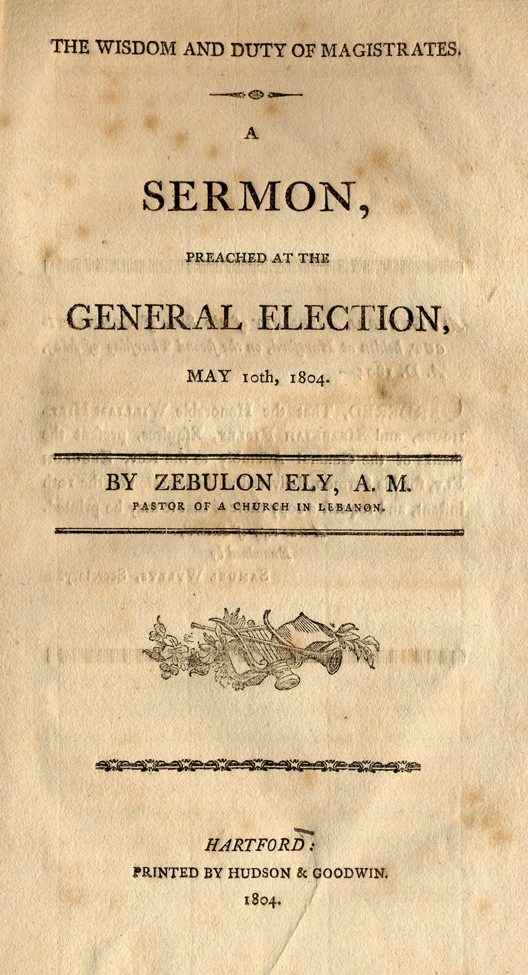
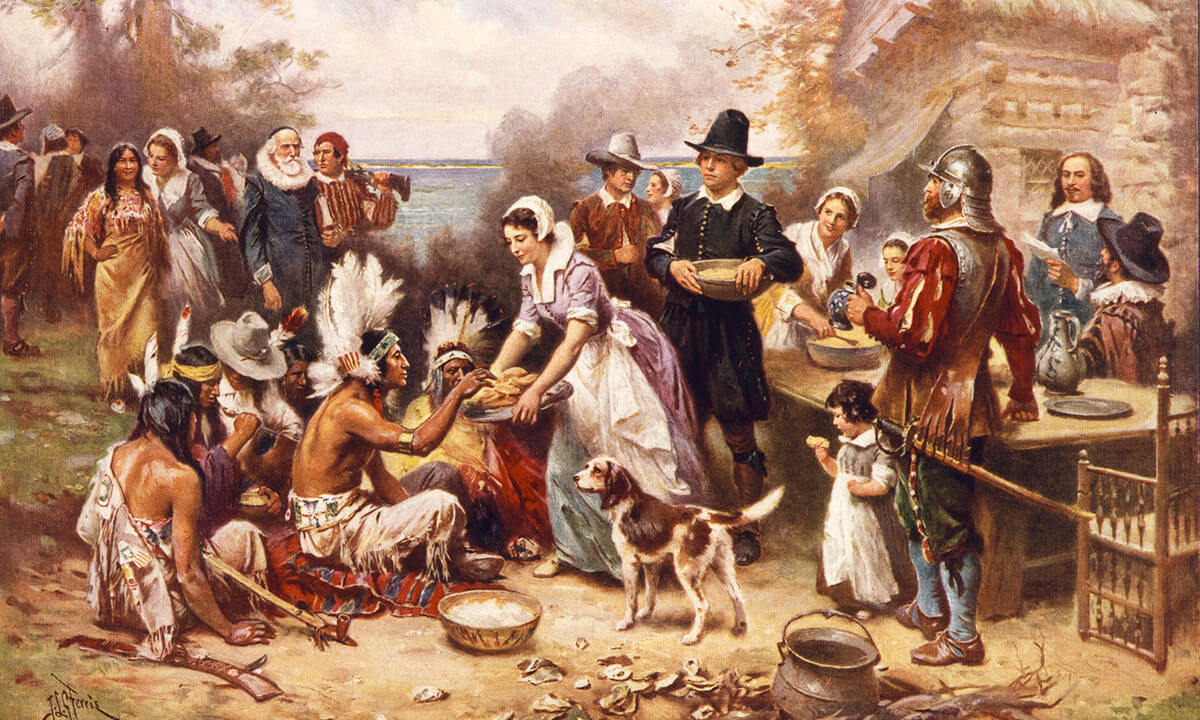
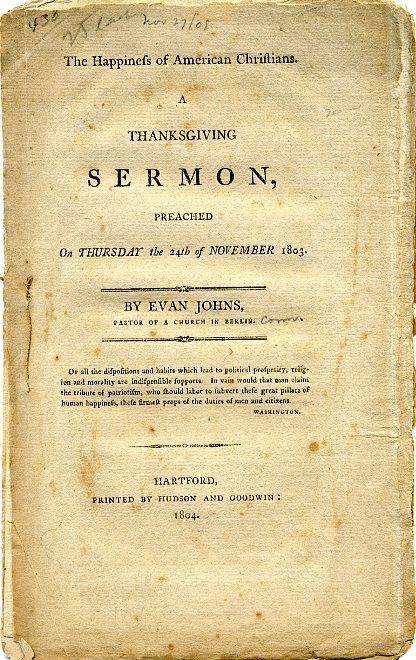
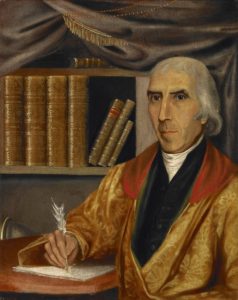 Born in New Haven, Connecticut, Morse graduated from Yale in 1783. He began the study of theology, and in 1786 when he was ordained as a minister, he moved to Midway, Georgia, spending a year there. He then returned to New Haven, filling the pulpit in various churches. In 1789, he took the pastorate of a church in Charlestown, Massachusetts, where he served until 1820. Throughout his life, Morse worked tirelessly to fight Unitarianism in the church and to help keep Christian doctrine orthodox. To this end, he helped organize Andover Theological Seminary as well as the Park Street Church of Boston, and was an editor for the Panopolist (later renamed The Missionary Herald), which was created to defend orthodoxy in New England. In 1795, he was awarded a Doctor of Divinity by the University of Edinburgh. Over the course of his pastoral career, twenty-five of his sermons were printed and received wide distribution.
Born in New Haven, Connecticut, Morse graduated from Yale in 1783. He began the study of theology, and in 1786 when he was ordained as a minister, he moved to Midway, Georgia, spending a year there. He then returned to New Haven, filling the pulpit in various churches. In 1789, he took the pastorate of a church in Charlestown, Massachusetts, where he served until 1820. Throughout his life, Morse worked tirelessly to fight Unitarianism in the church and to help keep Christian doctrine orthodox. To this end, he helped organize Andover Theological Seminary as well as the Park Street Church of Boston, and was an editor for the Panopolist (later renamed The Missionary Herald), which was created to defend orthodoxy in New England. In 1795, he was awarded a Doctor of Divinity by the University of Edinburgh. Over the course of his pastoral career, twenty-five of his sermons were printed and received wide distribution.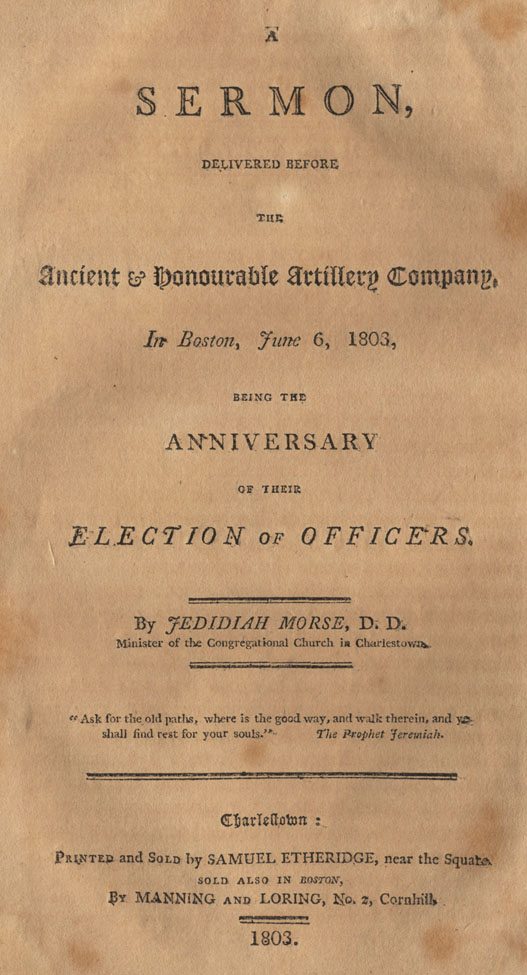
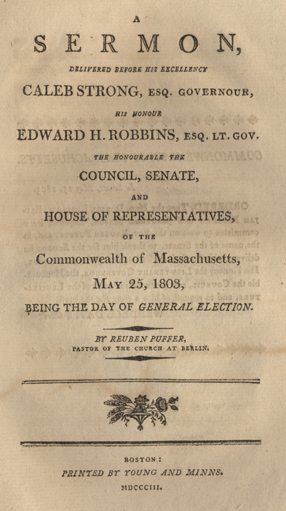
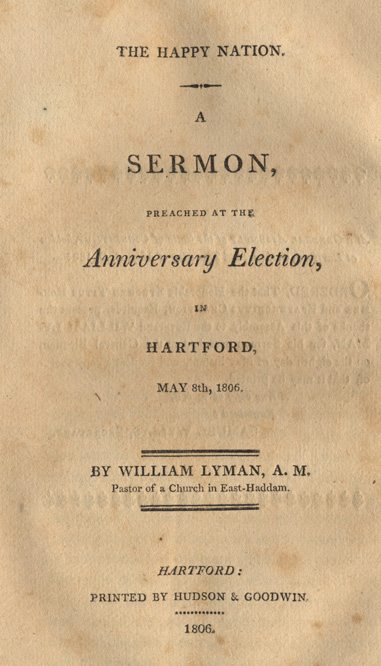
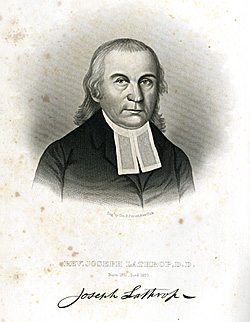 (1731-1820) Biography:
(1731-1820) Biography: